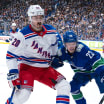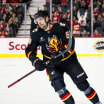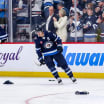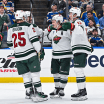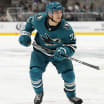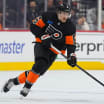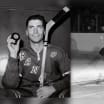Legendary hockey reporter Stan Fischler writes a weekly scrapbook for NHL.com. Fischler, known as "The Hockey Maven," shares his humor and insights with readers each Wednesday. This week Fischler turns back the calendar to 1938 when the New York Americans enjoyed their last hurrah by defeating the New York Rangers the Stanley Cup Playoffs.
The story is based on interviews Fischler conducted for his oral history, "Those Were The Days."
New York Americans stunned Rangers in 1938 playoff series win
Game 3 victory in fourth overtime was last hurrah for team that suspended operations soon after

© B Bennett/Getty Images
By
Stan Fischler
Special to NHL.com
Future Hockey Hall of Famers Clarence "Hap" Day, Nels "Ole Poison" Stewart and Ivan "Ching" Johnson were considered washed up as NHL players in the summer of 1937.
Day had been released by the Toronto Maple Leafs after being their captain and stalwart defenseman for more than a decade.
"I still thought I had some good hockey left in me," Day said. "And I found a team, the [New York] Americans, that thought the same way."
Same for Stewart, a sharpshooter who helped the Montreal Maroons win the Stanley Cup in his rookie year, 1925-26, and played 11 games with the Boston Bruins in 1936-37.
"I wanted to play more hockey," Stewart said. "And I knew one manager who believed in me -- 'Red' Dutton."
Dutton had starred as a Maroons defenseman before being traded to the Americans. By the 1936-37 season he had become manager and coach of the Americans, who shared Madison Square Garden with the New York Rangers.
He was looking for another defenseman in the summer of 1937 and when the Rangers released Johnson, the Americans quickly signed him.
"I'd seen enough of Johnson as a Ranger because he played against us so often," Dutton explained. "When I heard they didn't want him I said I'd give him work. With players like Stewart, Day and Johnson in my lineup I had three winners who I hoped had some gas left in their tanks."
Day and Johnson fortified New York's group of defensemen, and Stewart scored 36 points (19 goals, 17 assists) in 48 games.
"Nels put together a great season for us," teammate Lorne Carr remembered. "He finished among the League's top scorers (11th) and was only two points behind our leader Sweeney Schriner (38)."
After finishing last with a 15-29-4 record the season before, the Americans were 19-18-11 in 1937-38 and finished second in the Canadian Division.
The Americans were an upbeat, fun-loving bunch, a trait that fit the ebullient personalities of Stewart, Johnson and Day. Another castoff -- this one from the Bruins, defenseman Joe Jerwa -- often joined the veteran trio for laughs.
Once Dutton fined Jerwa $100 -- big money in those Depression days -- for a team infraction.
"Why not make it $200?" Jerwa mockingly suggested.
At this point, Dutton got into the spirit of things, replying, "Two hundred dollars it is. Now, Joe, do you want to go for $400?"
Jerwa laughed. "Heck, you can't fine me $400. I don't have that much coming to me."
A return to the Stanley Cup Playoffs and a first-round meeting with their rival Rangers was no laughing matter, though.
"The press labeled us 'The Bowery Boys,' giving us a blue-collar identity," Carr said. "The Rangers were known as the white-collar team. We had become natural and bitter rivals."
The Rangers were heavily favored but an upset seemed in the making when the Americans won the opener 2-1 on Johnny Sorrell's overtime goal. However, the Rangers rebounded to win the second game 4-2 to set the stage for a dramatic finale in the best-of-3 series on March 27,1938. It would be the longest, and one of the most thrilling, games in New York hockey history.
The largest crowd of the season, 16,340, jammed The Garden and saw a pulsating contest. It was the kind of tight, defensive game that suited the Americans, and playoff veterans Day, Stewart and Johnson were up for the task. The first period was scoreless, but sooner rather than later the ice was broken.
The Rangers scored twice early in the second on goals by Alex Shibicky and Bryan Hextall to take a 2-0 lead. Carr, who'd been traded by the Rangers to the Americans five years earlier, was worried about a blowout.
"We managed to shut them down after that," Carr remembered, "but we couldn't solve Davey Kerr in goal for them."
Indeed, Kerr preserved the 2-0 lead until Carr scored at 4:36 of the third period. Sport Life magazine editor Bruce Jacobs called it "the start of a great comeback."
"To tie the game Dutton put five forwards on the ice and the old veteran Nels Stewart came through for him with the goal which knotted the count (at 10:38) and forced overtime," Jacobs said. "In the first sudden-death session the teams settled down to a long scoreless duel featured by razor-sharp defensive play.
"The crowd buzzed with excitement in anticipation of the second overtime. Up and down the ice they surged but no goal was scored. The pressure was terrific."
It was now after midnight, the second overtime had ended and the rivals braced for the third extra session. For a moment it appeared that the Americans had won when Jerwa's shot beat Kerr but the puck hit the goal post and caromed harmlessly away, necessitating a fourth overtime.
"The teams came tearing out for the fourth extra session," wrote Jacobs, "and took up where they had stopped in the third. It was slam bang hockey but the end finally was in sight."
Early in the fourth overtime Jerwa and Art Chapman advanced the puck to Carr whose Rangers checker, Lynn Patrick, was caught out of position. It was a key strategic blunder.
"Lynn thought he'd get a fast break on me but I intercepted the puck," Carr told reporter Chuck O'Donnell in the book "The Game I'll Never Forget."
Instinctively, Carr took a shot and beat Kerr at 40 seconds of the fourth overtime. The game ended at 1:15 a.m.
The sweet victory infused Day, Stewart and Johnson with a feeling of redemption. They still had the goods and that fact immensely enthused the guy who originally had placed his faith in them.
"This was the greatest thrill I ever got in hockey," Dutton said. "The Rangers had a high-priced team and beating them was like winning the Stanley Cup for us."
Alas, the Americans never won the Cup. The Chicago Black Hawks defeated them in three games in the best-of-3 Semi-Finals in 1938 and the Americans suspended operations because of World War ll in 1942.
Defeating the Rangers was, indeed, their last hurrah.










